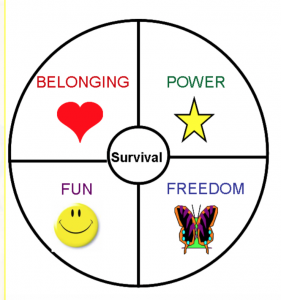Restitution
Restitution teaches about the 5 basic needs.

All behaviour is purposeful—we act to meet our needs. We can meet our needs in cheap ways (unsafe and unhealthy) or deep ways (safe and healthy). My students do a practice exercise in class using this card sort. Please take a look. Deep+vs+Cheap+card+sort
Restitution is not about using punishment or rewards to control a child’s behaviour. It is about self-discipline. The original meaning of the word discipline de-rives from the Greek word disciplina that means learning. Self-discipline is learning about oneself, learning to be a moral person, and learning to repair mistakes to heal hurt for oneself and for others.
A real restitution embodies:
1) creativity and it strengthens the person who offers to make it and it helps the group, and
2) identifying the needs of both the victim and the offender and the solution is one that helps both parties. Blame is shifted into learning how to fix mistakes so as to return to the group a stronger person.
Welcome to Restitution Self-Discipline
Do you want students to be responsible for their own behavior and learning? It is about restoring and strengthening children by obtaining a balance between providing them with enough structure, and educating them to understand and manage their own behavior in ways that help rather than hurt others.

Here is the green restitution handout I created for my students to fill out when they make a mistake:
Restitution_green sheet_studentFILL
Children who learn self-management and restitution will be a pleasure to live with.
Restitution also presents to both teachers and parents the Five Positions of Control:
- Punisher
- Guilter
- Buddy
- Monitor
- Manager
Restitution helps us guide our children to be self-managers.
Parents are our partners
Links to articles written by Diane Gossen that will provide an introduction to Restitution Self-Discipline are at the link below:
